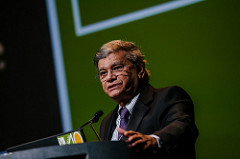 Bangladesh became independent in 1971. Since then, the Government of Bangladesh has worked hard to improve its agricultural production and food availability. The country, however, still faces persistent challenges such as worsening soil fertility, population growth, climate change, poverty, and lack of access to natural resources, making millions of people vulnerable. In its journey to overcome poverty, the Government of Bangladesh and IFPRI have worked together since the 1990s to develop evidence-based research on food aid, agricultural technology, gender dynamics in extension programs, nutritional interventions, and poverty reduction investments.
Bangladesh became independent in 1971. Since then, the Government of Bangladesh has worked hard to improve its agricultural production and food availability. The country, however, still faces persistent challenges such as worsening soil fertility, population growth, climate change, poverty, and lack of access to natural resources, making millions of people vulnerable. In its journey to overcome poverty, the Government of Bangladesh and IFPRI have worked together since the 1990s to develop evidence-based research on food aid, agricultural technology, gender dynamics in extension programs, nutritional interventions, and poverty reduction investments.
In 2010, IFPRI, with the Bangladesh Ministry of Agriculture and the United States Agency for International Development (USAID), launched the Bangladesh Policy Research and Strategy Support Program (BPRSSP), an initiative designed to improve agriculture, and food and nutrition security. This program facilitated the launch of the Agricultural Policy Support Unit that delivers real-time information to inform decision making. The BPRSSP also conducted the evaluation of the country’s largest safety net program that encouraged its renewal. Today, Bangladesh continues to adopt policies that emphasize strong food and nutrition security.
Muhammad Abdul Mannan, State Minister, Ministry of Finance and Ministry of Planning, People’s Republic of Bangladesh shared at IFPRI’s 40th Anniversary event how the country is making strides to improve food and nutrition security, and how IFPRI supports the government’s efforts.
“IFPRI and others have been helping us over the years in transforming our society to be self-reliant, self-sufficient, and modern…In the 40 years since our country has been independent, we have increased life expectancy from 46 to 72 years. We have tripled rice production.”


